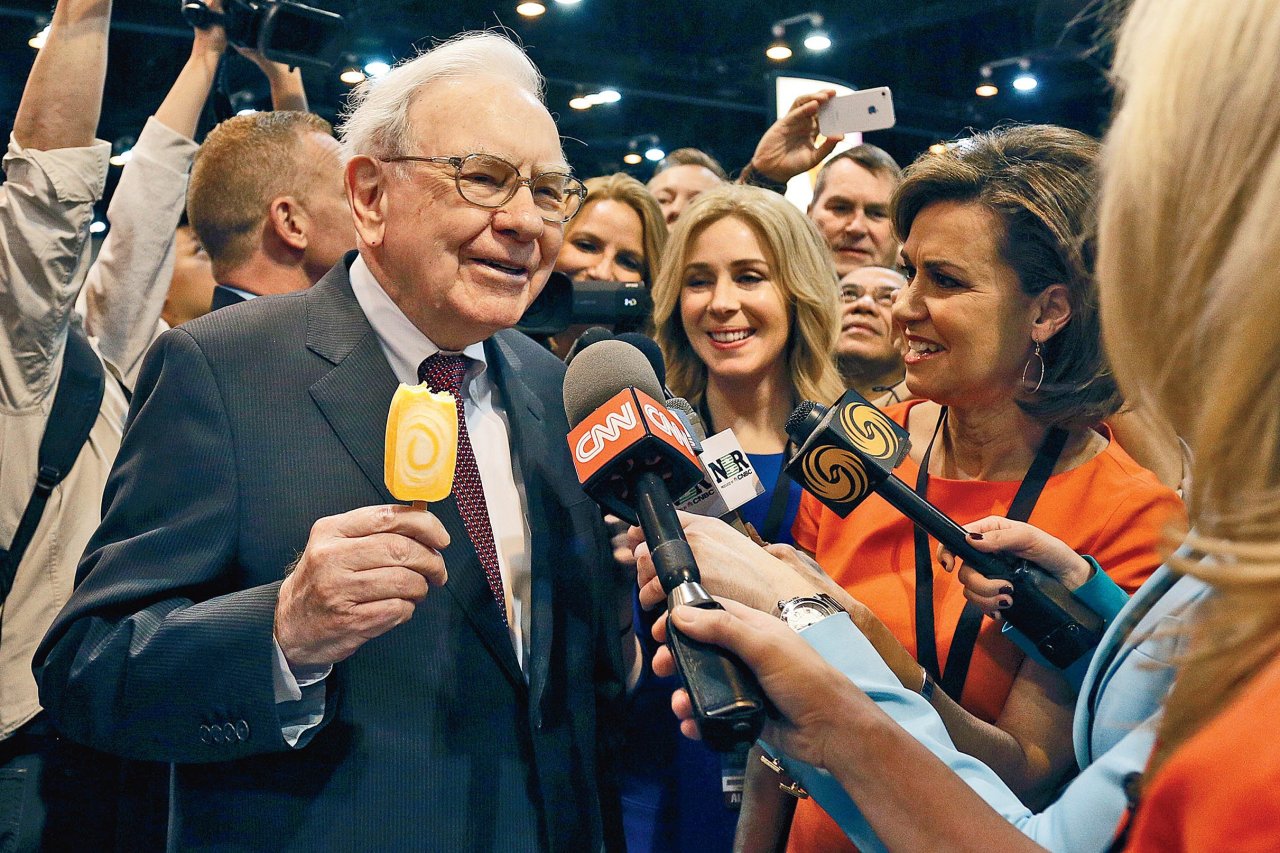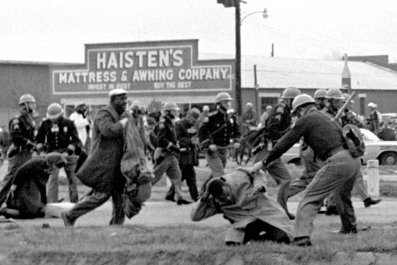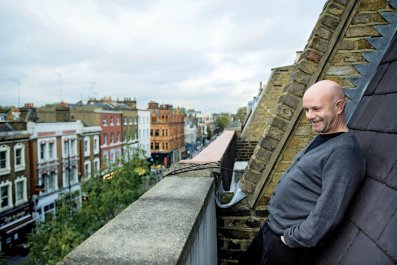Berkshire Hathaway, the giant conglomerate run for nearly half a century by lionized investor Warren Buffett, is drawing scrutiny for being less than crystal clear about how it is so profitable.
The questions from Wall Street analysts, insurance specialists and corporate governance experts put the spotlight on a behemoth with $517 billion in assets that in recent years has grown increasingly opaque with its financial disclosures. Better known for giving shareholders a staggering return of more than 693,000 percent since its birth in 1965, more than 70 times that of the S&P 500, Berkshire Hathaway, one of the world's largest companies, is one of the least transparent corporations in America.
"There's actually a tremendous amount we don't know about parts of this company," says Meyer Shields, an equity analyst who covers the company for investment bank Keefe, Bruyette & Woods. "It makes it incredibly difficult to assess the quality of earnings."
With Berkshire Hathaway due in early March to report another year of strong profits and to release its eagerly awaited annual letter to shareholders, questions are growing over when the 84-year-old Buffett, whose fortune Forbes pegs at $72.9 billion—making him the world's second-richest person—will retire. With a slowdown in earnings growth, Buffett's exit could challenge the "trust me" and "details not needed" aura cultivated for decades by the so-called Oracle of Omaha.
"You would think that Warren would want to become a standard for transparency, especially after the opaqueness in our banking system in the last cycle and the shrouded secrecy contained in the proliferation of derivatives nearly bankrupted the system," says Douglas Kass, a hedge fund manager and critic of Berkshire Hathaway.
The famously populist Buffett has long nurtured an aw-shucks image through homespun aphorisms ("I try to buy stock in businesses that are so wonderful that an idiot can run them. Because sooner or later, one wil.l") and a picture on the company's website that shows him surrounded by three smiling, miniskirted cheerleaders with pompoms as he sports a Berkshire Hathaway "activewear" Oxford shirt with an embroidered $100 bill on the pocket. The company's invitation-only annual shareholder meetings in Omaha, Nebraska, attract upward of 50,000 adoring shareholders and resemble religious revivals, complete with Buffett playing "Over the Rainbow" on his ukulele. Two years ago Buffett and his right-hand man, Berkshire Vice Chairman Charlie Munger, now 91, danced to "Gangnam Style" and starred in a Breaking Bad parody about cooking peanut brittle, not crystal meth, that ended with Munger declaring, "Brittle, bitches!," according to Kass, who was at the meeting.
An empire builder of the kind last seen during the Gilded Age of industrial magnates, Buffett has some 98 percent of his net worth tied up in Berkshire stock, according to Securities and Exchange Commission (SEC) filings. The world's leading philanthropist, he vowed in 2010 to give away nearly all of his assets. Just last year, he donated $2.1 billion in Berkshire stock to the Bill & Melinda Gates Foundation.
Buffett's democratic, plain-speaking, man-of-the-people image ("I buy expensive suits—they just look cheap on me") belies the reality that he is an imperial chief executive. The evidence of that is not excessive compensation or outlandish perks but Berkshire Hathaway's increasing reluctance to disclose key details about the performance of its core insurance businesses. "You cannot see into the actual economics of the core businesses," says Jim Shanahan, who covers the company for investment bank Edward Jones. "They fall well short of the disclosure we've come to expect of other financial services companies, particularly in the insurance space."
In its most recent "Transparency in Corporate Reporting" annual report last November, Transparency International, a global watchdog group, gave Berkshire Hathaway a 35 out of 100, one of the lowest scores—and just above four Chinese banks and Russia's Sberbank.
Not that Buffett, who is both chief executive and chairman, doesn't pay lip service to transparency. At Berkshire's "Woodstock for Capitalists" annual meetings in May in Omaha, he mingles with ordinary shareholders, who this year will again be treated en masse to a steak dinner at Gorat's Steak House, a local joint. But he's also unapologetic about the opacity. "We much prefer to purchase $2 of earnings that is not reportable by us under standard accounting principles than to purchase $1 of earnings that is reportable," he writes in his "Owner's Manual," a manifesto-style treatise on Berkshire's website.
Berkshire Hathaway is nominally a financial services company, primarily through its auto insurer Geico and Gen Re insurance units. But functionally it is a sprawling mishmash of wholly owned (or close to it) businesses that include railroads (Burlington Northern Santa Fe, or BNSF Railway, North America's second-largest freight rail), a prefab trailer and mobile home maker (Clayton Homes), a private jet operator (NetJets Inc.), underwear (Fruit of the Loom), cookware (The Pampered Chef) and See's Candies, among five dozen other companies ranging from utilities and energy services to Oriental Trading and Dairy Queen. The company, with a market capitalization of around $366 billion, made $19.5 billion in profits in 2013 and also holds big stakes in Coca-Cola, Wells-Fargo, IBM and American Express.
For some businesses, like BNSF, Berkshire Hathaway discloses a good amount of detail on expenses, revenues, margins and cost allocations. But for other businesses, notably its core insurers, the company is a bit of a black box, because Berkshire Hathaway rolls up financial figures for its various businesses into a single, consolidated report broken down into broad "segments" that include multiple subsidiaries.
Unheard-of among large corporations, the company has no investor relations department to liaise with Wall Street, and conducts no quarterly earnings calls. Its website looks as if it was designed by a high schooler, and Buffett does not allow recording devices at or provide transcripts from annual meetings. Calls and emails to Berkshire spokeswoman Carrie Sova to discuss this article were not returned.
Buffett, who effectively owns around 20 percent of Berkshire Hathaway's stock, acknowledges the lack of specifics. In his "Owner's Manual" he says that "because of the limitations of conventional accounting, consolidated reported earnings may reveal relatively little about our true economic performance."
Among the unanswered questions: How much risk are Gen Re and Geico, whose businesses are notoriously volatile, exposed to? It's not a question investors or analysts can answer easily, because unlike most big insurers, Berkshire Hathaway does not break out key metrics such as growth in written premiums, underwriting expenses, net earned premiums and the like. Under SEC rules, it doesn't have to.
For Clayton Homes, a risky consumer-lending business catering to typically lower-income borrowers, Berkshire Hathaway provides no disclosures on the degree to which it allows borrowers to assume big payments on homes of lower value, a key metric known as the loan-to-value ratio; on how many borrowers are delinquent on payments or borrowers' average credit scores; or on repossessions.
And what about Berkshire Hathaway's exposure to derivatives, the fancy financial contracts that upended Wall Street during the 2008 mortgage meltdown and credit crisis? (In 2002, Buffett called them "financial weapons of mass destruction.") Shanahan says, "We don't know what risks they're taking and whether the company should sell some of the businesses."
Nobody is suggesting Berkshire Hathaway is doing anything improper with its disclosures or accounting. But because insurance companies have different accounting rules from financial services companies like Berkshire Hathaway, a lot of its insurance-related risks do not show up in SEC filings.
Jonathan Terrell, a former senior executive at Swiss insurer Zurich Financial Services and the founder and president of KCIC, a risk-management consulting firm in Washington, D.C., says that through a series of complex transactions involving transfers of losses from other insurers to Berkshire Hathaway, Buffett's company, unbeknownst to many observers, contains the biggest concentration of legacy insurance liabilities, mostly related to asbestos and environmental claims, in history.
Terrell cites a separate, required annual disclosure filed by Berkshire Hathaway's National Indemnity Company subsidiary, known as NICO, in 2013 to the National Association of Insurance Commissioners (NAIC), an industry regulator. NICO is the core Berkshire Hathaway subsidiary that handles loss transfers through a complex financial instrument known as retroactive reinsurance, a derivatives-heavy business in which an insurer assumes coverage for liabilities that were originally insured by another insurer.
In the NAIC filing, NICO estimated that it needed a whopping $17 billion in reserves to cover retroactive claims on loss transfers related largely to asbestos and environmental hazards as of year-end 2012—by far the most of any company in the industry. The figure is in addition to the nearly $2.6 billion in reserves for asbestos and environmental claims that Berkshire Hathaway reported in its SEC filings.
The eye-popping NAIC number is nowhere to be found in Berkshire Hathaway's SEC filings because publicly traded insurers do not have to disclose details to the SEC regarding loss transfers. The upshot, Terrell says, is that a company that tells shareholders it has set aside nearly $2.6 billion is showing that it in fact needs to set aside more than $19 billion. "There's nothing nefarious; it's just misleading" to look only at the SEC filings, Terrell tells Newsweek.
Since early 2014, the Treasury Department has had a separate concern about the company's size, according to a 2014 Bloomberg report citing unnamed sources: whether Berkshire Hathaway is "systemically important" enough to the U.S. and global economies to require federal supervision, with potentially tighter capital controls and liquidity requirements. A Treasury spokeswoman declined to comment, citing agency rules that ban confirming or denying such reviews by the agency's Financial Stability Oversight Council unless the company itself goes public with them.
Berkshire Hathaway has endured troubles before. In 2008, a federal jury handed down criminal convictions to four senior General Re executives caught up in an accounting probe, but an appeals court overturned the convictions in 2011. In January 2013, a former top lieutenant to Buffett, David Sokol, escaped insider-trading charges by the SEC after he bought stocks in Lubrizol about two months before Berkshire Hathaway acquired the company for $9 billion.
So why don't shareholders clamor to know more, particularly in a climate of growing investor activism and heightened focus on transparency and governance?
Unusual for a company of its size, Berkshire Hathaway's shareholder base is less large institutional investors with tricky questions and more mom-and-pop shareholders who, as long as their shares are growing, don't need to know, or don't know that they need to know. "Berkshire's shareholders are not normal shareholders—they believe hook, line and sinker in Warren," says Kass, president of Seabreeze Partners Management. James McRitchie, who runs CorpGov.net, a widely watched blog, says that doubting Buffett "is like doubting your grandfather. He gets away with things others don't."
Only when Buffett retires—he chose a successor in 2012 but hasn't named him or her—or if something goes badly wrong might things become clearer. One of his favorite sayings is, "Only when the tide goes out do you discover who's been swimming naked."



























